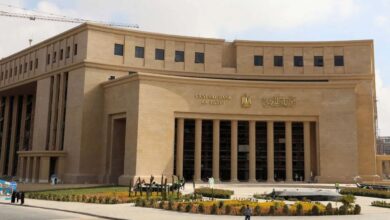A 40-percent tax increase was levied on tobacco products this month with the stated aim of reducing the number of smoking-related deaths in Egypt and boosting revenue for the public health system.
According to World Health Organization statistics, 82 percent of regular cigarette smokers consume between 16 and 20 cigarettes per day in Egypt. Consequently, smoking-related illnesses claim more than 37,000 lives each year, the Egyptian Health Ministry has reported.
Yet despite the state’s seeming concern for public health, tobacco retailers–and smokers–complain bitterly about the new tariffs.
Kiosk owner Mohamed Zaghloul, for one, is considering closing his business after chalking up immediate financial losses due to the tax increases.
“Wholesale cigarette traders are selling tobacco to retailers at prices higher than those imposed by the government,” he said. He called for greater government control over marked-up pricing by wholesalers “in order to protect retailers from their greed.”
As a result of the new tariffs, retail prices for premium-brand cigarettes–such as Marlboro and Merit–have risen from LE8.5 to LE10 per pack. Local cigarettes, meanwhile, such as Egypt’s flagship Cleopatra brand, have risen in price from LE3.25 to LE4.50 per pack.
According to supermarket owner Salwa el-Araby, low-income smokers represent the chief victims of the new taxes.
“Many customers are angry,” she said. “As soon as they heard of the tax increase, many said they would give up smoking.” Others, she added, have switched to local tobacco brands, which are considerably less expensive than their imported counterparts.
“I’ve been forced to cut back as a result of the the tax increase, even though smoking represents my sole pleasure under the current dire economic circumstances,” said one frustrated smoker. “Now I have to buy cigarettes individually, since I can’t afford to buy whole pack.”
Notably, demand for imported cigarettes appears to have been less affected by the price hikes than that for local brands.
El-Araby says that the LE1.5 increase on the price of premium brands has not deterred high-income consumers from buying their preferred choice of cigarette. “The price raises mainly impact consumers of local cigarettes–those who can barely afford them,” she said.
Ahmed Ramy, another kiosk owner, says his sales revenue has been cut in half since the tax increases came into effect.
“How can I make a profit when I buy a pack of Marlboros for LE9.95 from wholesalers and producers, then sell it to the customer for LE10,” he said. He went on to urge the government to take the plight of the poor into consideration before burdening them with heavy new consumer taxes.
As for the government’s stated reason for raising taxes on cigarettes–to help smokers kick the habit–computer company employee Ahmed Gamal expressed skepticism.
“The government only cares about its own interests,” he said. “It is obviously an underhanded way of generating more money.”
The new regulations do not represent the government’s first attempt to combat the heavy per-capital tobacco consumption for which Egypt is infamous. Two years ago, the government launched an awareness campaign against smoking, in which producers were obliged to print unattractive images–including a man on a respirator and the famous “limp cigarette”–on all their cigarette packs.
In a related development, the government announced last month that Egyptian second city Alexandria would soon be made completely “smoke-free,” beginning with a ban on smoking in all government buildings and establishments.




